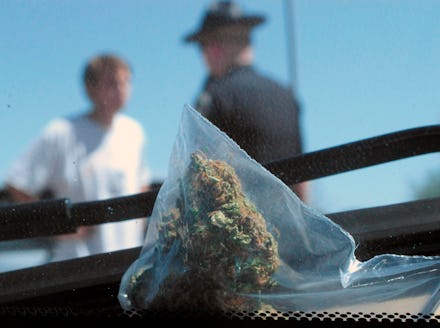Here's What 5 Nobel Prize-Winning Economists Think About the War on Drugs

We should end it.
This according to the London School of Economics' IDEAS Center's "Ending the War On Drugs" report, which examined the war on drugs' high toll on everything from public safety and health to the incarceration rate across the world. The report argues that the goal of a "drug-free world" is impossible and that nations need to adopt a better, policy-oriented response to global drug demand. There has been "enormous collateral damage from excessively militarized and enforcement-led drug policies," the report finds, and "continuing to spend vast resources on punitive enforcement-led policies, generally at the expense of proven public health policies, can no longer be justified."
Five past winners of the Nobel Prize in Economics have endorsed the report: Kenneth Arrow (1972), Vernon Smith (2002), Thomas Schelling (2005), Oliver E. Williamson (2009) and Sir Christopher Pissarides (2010).
It comes with other endorsements from the likes of George Shultz, former President Ronald Reagan's secretary of state; British Deputy Prime Minister Nick Clegg; and Javier Solana, the former EU high representative for common foreign and security policy.
"There is an increasing recognition among world leaders that the war on drugs strategy has been a disaster. It has created enormous collateral damage and achieved none of its stated objectives," lead author John Collins told Al Jazeera America.
"People are afraid of drugs — rightly so, these substances can destroy people's lives," Collins said. "But their lack of knowledge results in vitriolic reactions, overreactions. At this point, they're doing more harm than the drugs themselves."
Here are some key points:
Targeting drug suppliers doesn't work because of "shifting commodity supply chains." When one drug supplier is taken out, prices increase and other drug gangs and cartels step in to create new supply networks. The demand for drugs is so high that governments can't keep up with the black market.
Source: RAND Corp.
Cracking down on suppliers only results in more violence. Periodic price spikes, as well as a guaranteed market, have meant eliminating drug lords results in fighting for their now-vacant territory. The report finds that just the increase in the size of drug markets from 1994-2008 (it doubled) could probably explain about 25% of homicides in Colombia alone. That's basically a low-level war, or about "3,800 more homicides per year on average."
In Mexico, homicides tripled over a four-year span, where the ongoing drug war has killed at least 60,000 and likely over 100,000 (more troops than the Union lost in action in the Civil War) and it might just be getting started.
These have all kinds of economic ripple effects, ranging from lost tourism to no limes on Cinco de Mayo.
It's led to mass imprisonment. Drug offenses are estimated to account for 40% of the world's 9 million prisoners. This system is an extremely expensive revolving door, with a U.S. analysis of 40,000 prisoners in 1994 finding 56% of prisoners "resumed their pre-incarceration offending trajectories." The rapid growth of the U.S. prison system can be largely explained by the drug war.
Source: Bureau of Prisons
Meanwhile, treating people for their drug habits has been demonstrated to save a lot more money than arresting them. Using 43 treatment facilities in California as a sample, researchers found that "treatment cost an average $1,583 per person but benefited society at the level of $11,487, a 7:1 ratio." For every dollar spent on a needle exchange program (2000-2009), society saved about $27 in costs. "Conservative" estimates show opoid treatment programs save at least 12 times what they cost, including crime, the justice system and health care.
We can't do much worse, so let's try something new. UCLA drug policy expert Mark Kleiman and BOTEC Analysis drug researcher Jeremy Ziskind believe "regulatory experimentation" is the only way to determine which anti-drug strategy we will need to use going forward. For example, "the places that legalize cannabis first will provide — at some risk their own populations — an external benefit to the rest of the world in the form of knowledge, however the experiments turn out."